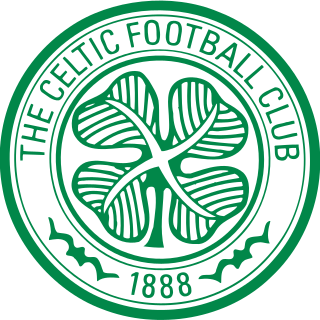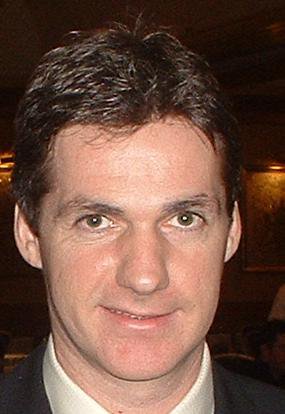Related Research Articles

The Celtic Football Club, commonly known as Celtic, is a professional football club in Glasgow, Scotland. The team competes in the Scottish Premiership, the top division of Scottish football. The club was founded in 1887 with the purpose of alleviating poverty in the Irish–Scots population in the city's East End area. They played their first match in May 1888, a friendly match against Rangers which Celtic won 5–2. Celtic established themselves within Scottish football, winning six successive league titles during the first decade of the 20th century. The club enjoyed their greatest successes during the 1960s and 70s under Jock Stein, when they won nine consecutive league titles and the 1967 European Cup. Celtic have played in green and white throughout their history, adopting in 1903 the hoops that have been used ever since.

William McNeill was a Scottish football player and manager. He had a long association with Celtic, spanning more than sixty years as a player, manager and club ambassador. McNeill captained Celtic's 'Lisbon Lions' to their European Cup victory in 1967 and later spent two spells as the club's manager. As a player and manager, he won 31 major trophies with Celtic.

The Lisbon Lions is the nickname given to the Celtic team that won the European Cup at the Estádio Nacional in Lisbon, Portugal on 25 May 1967, defeating Inter Milan 2–1.

John Stein was a Scottish football player and manager. He was the first manager of a British side to win the European Cup, with Celtic in 1967. Stein also guided Celtic to nine successive Scottish League championships between 1966 and 1974.
Ronald Campbell Simpson was a Scottish football player and coach. He is mainly remembered for his time with Celtic, where he was the goalkeeper in the Lisbon Lions team that won the European Cup in 1967. Earlier in his career, Simpson had won the FA Cup twice with Newcastle United. He also played for Queen's Park, Third Lanark and Hibernian. Simpson represented Great Britain in the 1948 Olympics, but was not selected for Scotland until 1967. He made his international debut in the famous 3–2 victory against England at Wembley.
Thomas Stephen Chalmers was a Scottish footballer who played as a centre-forward and spent the majority of his career with Celtic. He is the club's fifth-highest goalscorer with 236 goals and is considered one of their greatest players. He is particularly known for scoring the winning goal in the 1967 European Cup Final against Inter Milan. Chalmers later played for Morton and Partick Thistle. He also represented Scotland five times in international matches.

Robert White Murdoch was a Scottish professional footballer, who played as a midfielder for Celtic, Middlesbrough and Scotland. Murdoch was one of the Lisbon Lions, the Celtic team who won the European Cup in 1967. He later also managed Middlesbrough.
Robert Auld was a Scottish football player and manager. He was a member of Celtic's Lisbon Lions, who won the 1967 European Cup Final.

Celtic Football Club was constituted in 1888 with the purpose of creating a club for Irish Immigrants. Celtic play home games at Celtic Park, having moved there from their original ground in 1892. The club has always competed in the highest level of football in Scotland, currently the Scottish Premiership, since the inception of league football in Scotland. Celtic quickly established itself as a dominant force in Scottish football, winning six successive league titles during the first decade of the 20th century. A fierce rivalry developed with Rangers, and the two clubs became known as the Old Firm.
John Fallon is a Scottish former professional footballer and member of the Celtic squad that won the European Cup in 1967, which came to be known as the Lisbon Lions.

Thomas Gemmell was a Scottish football player and manager. Although right-footed, he excelled as a left-sided fullback and had powerful shooting ability. Gemmell is best known as one of the Celtic side who won the 1966–67 European Cup; he scored the first Celtic goal in the final. Gemmell played 18 times for Scotland, and also played for Nottingham Forest, Miami Toros and Dundee. After retiring as a player in 1977, Gemmell managed Dundee and Albion Rovers.

The 1966–67 season was the 94th season of competitive football in Scotland and the 70th season of Scottish league football.

Joseph Miller is a Scottish retired footballer and a former manager of Scottish Football League club Clyde.

The 1967 European Cup final was a football match contested between Italian team Internazionale and Scottish team Celtic to determine the champion of the 1966–67 European Cup. It took place on 25 May 1967 at the Estádio Nacional in Lisbon, Portugal, in front of a crowd of 45,000. The match was Celtic's first European final and Inter's third; the Italian club had won the tournament in two of the previous three years.
Charles Gallagher was a footballer who played as an inside forward. At club level he played mainly for Celtic, as well as Dumbarton. Born in Scotland, he represented the Republic of Ireland at international level, making two appearances for the team in 1967. He was a member of the renowned Lisbon Lions team that won the European Cup in May 1967.
Henry Anthony Hood was a Scottish football player and manager.
Celtic competed for five trophies in the 1966–67 season and the club won all of them: the Scottish League, the Scottish Cup, the Scottish League Cup, the Glasgow Cup, and the European Cup, and completed the only ever European Quintuple. However, their European Cup victory from this season qualified them for the World Championship the following season, which they went on to lose in a playoff to Racing. Over the course of this season, Celtic scored a world record 196 goals in the major competitions they took part in.
In Scottish football the term nine in a row refers to winning the league championship in nine consecutive years. This has been accomplished twice by Celtic and once by Rangers. It has become a commonly-used phrase, and a topic which has drawn much attention, as has the goal of winning ten in a row.
References
- ↑ "Who has won a treble, including domestic league and cup titles, plus the European Cup or UEFA Champions League?". UEFA. 10 June 2023. Retrieved 14 June 2023.
- ↑ Jensen, Neil Fredrik (1 June 2022). "Celtic 1967 – the only quadruple winners". Game of the People. Retrieved 14 June 2023.
- ↑ "Statistics 1966-67". The Celtic Wiki. 16 June 2023. Retrieved 16 June 2023.
- 1 2 John Clark at the Scottish Football Association
- 1 2 3 Sullivan, Joe; Donnelly, Joe (13 March 2021). "Happy Birthday to Cesar's right-hand man, John Clark". celticfc.com. Celtic FC. Retrieved 18 March 2021.